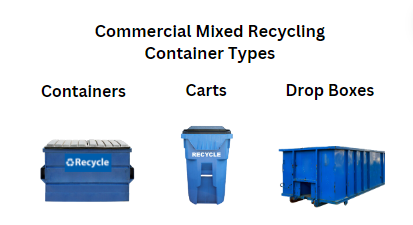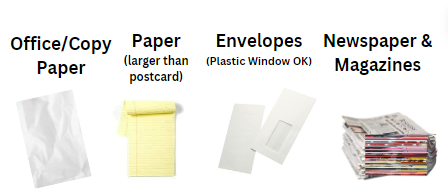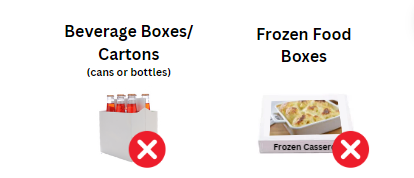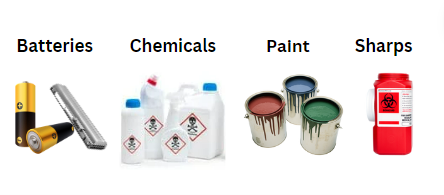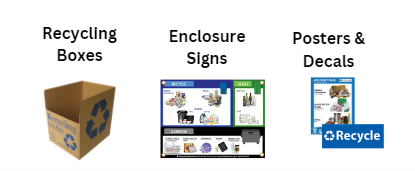Metal cans, plastic bottles, glass bottles and jars, paper and cardboard are all common items and packaging that we know we can toss in either our curbside recycling cart or glass bin at home. While commercial recycling service in Clark County accepts the same types of materials that residential recycling does, the items in a business waste stream can look very different from that of a household. There are items found in the commercial recycling stream that we either don't see in a household setting, or that come in smaller sizes and quantities. Read on to learn more about what is accepted in commercial recycling and find out what waste prevention and recycling resources are available to businesses in Clark County.
Plastic Containers
Plastics are accepted for recycling in Clark County based on size, shape and rigidity. Bottles, tubs, jugs and jars that are larger than the size of a fist, and that hold their shape, are accepted. Any other shapes, items that are too small, and flimsy plastics that crush and stay flattened, should be placed in the garbage. Plastic lids that screw onto containers can stay on, but any lids that "pop off" should stay off. In the commercial waste stream, it is common for packaging to incorporate multiple materials. Sometimes both materials might be accepted for recycling, but they need to be separated first. A common example is plastic cooking oil jugs that have cardboard boxes around them. The cardboard must be separated from the plastic jug for both materials to get sorted and recycled successfully.
Plastic Film
Pallet wrap, bubble wrap, air pillows and other plastic films are commonly used by businesses. Plastic film is recyclable but NOT accepted for recycling in your recycling container. Plastic film that gets collected in recycling trucks will end up getting wrapped around sortation equipment. This causes equipment failure and shutdowns that result in the loss of good recyclables. If you are looking to recycle plastic films, drop-offs are located at participating retailers and can be self-hauled to any of the
three local transfer stations.
Mixed recycling containers can be dumpsters, carts, or drop boxes
Metals
Depending on the business type, metals in your waste stream can be soda cans, large foodservice packaging, or large pieces of furniture or equipment. While larger items like file cabinets can be recycled, it is important to note that the materials collected from your serviced recycling container get loaded onto sortation equipment. For this reason, items over 35 pounds should not be placed in a mixed or commingled recycling container. They can be self-hauled to the scrap metal bins at local transfer stations, or if scrap metal is a regular occurrence in your waste stream, you can look into getting a larger container called a
drop box that could be devoted to collection of metals only.
Glass
The only type of glass accepted for recycling in our area is the kind used for food and beverage packaging. Any other type of glass, like mirrors, dishes, baking ware, food storage containers or windows, should be placed in the garbage. Remove lids from glass containers before recycling. Glass recycling should always be separated from other recyclables, meaning it should never be placed in a mixed recycling container. Broken glass contaminates other recyclables and damages reprocessing equipment.
Examples of recyclable paper products
Paper
Paper is accepted in mixed recycling containers. However, shredded paper cannot be collected successfully as it only creates litter during collection, transport and sortation. If you have any shredded paper, it can be dropped off at a local transfer station or placed into the garbage.All paper should be the size of a post card or larger for recycling.
Cardboard
Cardboard should not have food or grease on it. Try to remove tape when possible. Be sure to flatten all cardboard before placing it in your service container. This is important for the collection and sortation process, but it also can save you money and minimize messes in your waste enclosure because it reduces the amount of space taken up in your container.
Examples of fridge-safe and freezer-safe packaging
Freezer-safe and fridge-safe packaging
Paper packaging that has been designed to withstand freezer and fridge humidity has chemicals in it that make it less desirable to paper mills. For this reason, these items are not accepted in the local recycling program and should be placed in the garbage. Common examples of this would be the thin cardstock-like material that canned and bottled beverages are often packaged in.
Cartons
Food and juice cartons are accepted for recycling. Be sure that they are empty and give them a quick rinse, just like you do at home.
Food scraps/ food waste
Commercial food waste collection service is available in most parts of Clark County. Diverting food waste from the landfill helps to reduce garbage and your impact on the environment. Landfilled food produces methane, a potent greenhouse gas that contributes to climate change. The food waste collected through this service gets composted, which means it gets turned into a nutrient-rich soil amendment that can be used to grow more food in our region. If you aren't currently diverting food waste at your business, we encourage you to reach out to our team to learn about Clark County's
We Compost pilot program, and find out what food waste diversion can look like for you.
Expanded polystyrene/ block foam
Expanded polystyrene, also known as block foam, can be a difficult and expensive material to recycle. For this reason, there are very few options for recycling in our area. Commercial quantities are accepted with a service agreement at
EarthFriendly Recycling. Visit their website for acceptance guidelines and call ahead to inquire about larger, commercial quantities.
Electronics/ e-waste
Electronics like televisions, computers, laptops, monitors, tablets, e-readers and portable DVD players, are accepted at all of our local transfer stations as part of the
E-cycle Washington program. There are several other participating locations in the county that can be searched on the E-cycle Washington website. Other electronics items like keyboards, mice, toner cartridges, cell phones and printers are not included in the E-Cycle Washington program but are accepted at many Best Buy and Staples stores.
Green Century Recycling is used by some of our Certified Green Businesses, they offer a $45 flat rate fee for e-waste pick-up service. If items are in working condition, consider donation for reuse.
Hazardous waste
Examples of hazardous waste
Lightbulbs, batteries, paint, pesticides, sharps and other hazardous items should be disposed of properly to ensure that there is no harm to people or the environment. Commercial hazardous items are NOT accepted at the household hazardous waste drop-offs located at transfer stations. It is the responsibility of businesses operating in Clark County to ensure that their hazardous waste is safely disposed of. For information on what is considered hazardous waste and to find local vendors that are permitted to accept various types of hazardous waste, visit the Clark County
business hazardous waste page.
Examples of available workplace recycling resources
Additional resources
There are free guides, posters, recycling receptacles and other resources available to businesses in Clark County. You can explore the resources that are available and place an order here.
If you are interested in a waste audit for your business, have questions about your commercial recycling service, or if you would like to request a presentation about recycling at your business, please contact Marcus Merlonghi, the Commercial Recycling Coordinator at Waste Connections.
